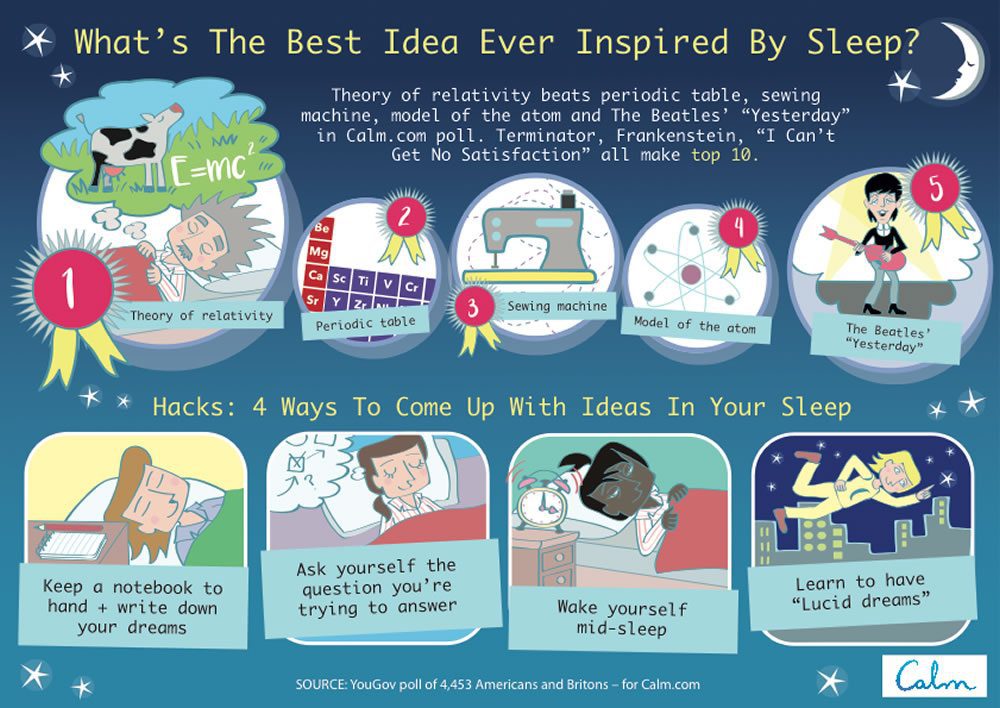[dropcap style=”font-size:100px;color:#992211;”]E[/dropcap]instein’s theory of relativity has been voted the greatest idea ever inspired by sleep, in a YouGov poll on behalf of Calm, the meditation and sleep app recently named Apple’s App of the Year. It topped a dazzling list of such ideas, ahead of the periodic table of elements in second place and the invention of the sewing machine in third.
Calm commissioned the poll to mark the 200th anniversary this March of Frankenstein, the Gothic novel first published in 1818 after the idea came to its teenage author Mary Shelley in a dream about a corpse brought back to life by electricity. Respondents to the poll picked from a shortlist of 12 great ideas either conceived during sleep or/and inspired by dreams. Frankenstein shared just eighth place in the poll with the Rolling Stones song, “I Can’t Get No Satisfaction”. “Yesterday”, the tune for which came to Paul McCartney in his sleep one night in 1964, polled highest of any idea from the arts rather than sciences, ranking fifth overall—one behind the model of an atom, devised by the Danish physicist Neils Bohr.
This kind of “intelligent information processing that inspires creativity and promotes problem-solving” is a distinct benefit of REM sleep and the act of dreaming, says Matthew Walker, the Berkeley University sleep scientist, in his acclaimed new book, Why We Sleep: The New Science of Sleep and Dreams.
“Sleep seems to stimulate your mind to make non-obvious connections,” Walker has said. “It puts all the information from the day into a big biological theatre and forces the mind to speak to people at the back of the theatre, who you may not think you have any connection with. This is the basis of creativity: connecting ideas, events and memories that wouldn’t normally fit together.”
Not only is it possible to boost your odds of generating ideas while you sleep but there’s even a scientific name for it: structured unconscious generative ideation. A non-scientific name for it might be “sleep-storming”, as in brainstorming, but done solo and while you’re asleep. But can you really train your brain to harvest your sleep for ideas? And is sleep-storming the new brainstorming?
Here are four simple ways suggested by Calm to increase your chances of coming up with ideas while you sleep—and/or capturing the ones that you do.

1. Keep a Notebook Handy and Write Down Your Dreams
It can be hard to remember your dreams and/or any ideas they inspire. So, always keep a notebook by your bed. Get into the habit of writing down your dreams—and any ideas they might trigger—immediately on waking and almost before you are fully awake. Write down every dream you can recall rather than being selective. The act of writing them down helps you build a relationship with your subconscious, which should in turn help improve your dream recall.
2. Ask Your Subconscious The Question You’re Trying to Answer
“Never go to sleep without a request to your subconscious,” advised Thomas Edison, the great inventor. So, instead of just falling asleep, brief or prime your subconscious to generate new ideas. Before falling asleep, ask yourself the question that you’re trying to answer, then, finally, focus on something else, such as reading or relaxation techniques.
3. Wake Yourself Mid-Sleep
Waking yourself while dreaming or starting to fall asleep was a technique used by both the artist Salvador Dalí and the inventor Thomas Edison. Dalí would put a tin plate on the floor and then sit on a chair beside it, holding a spoon over the plate. He’d then try to doze off so that the spoon would fall and wake him. Edison did similar but with ball bearings and a saucepan. The aim for both was to jolt themselves awake in order to capture ideas from their dreams.
4. Learn to Have Lucid Dreams
Lucid dreaming is the sense of being consciously aware that you are dreaming. This state can help you to explore ideas, control elements of your dream and have better than normal dream recall. Learning to dream lucidly takes time and practice. You need to try repeating a mantra telling yourself that you want to dream or know that you are dreaming and, for example, want to be aware that you are dreaming and to remember the dream.

Naila Scargill is the publisher and editor of horror journal Exquisite Terror. Holding a broad editorial background, she has worked with an eclectic variety of content, ranging from film and the counterculture, to political news and finance.




















